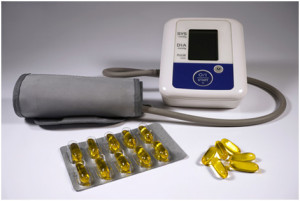Diets rich in omega-3 fatty acids may help lower blood pressure in young, healthy adults

Date:
November 14, 2016
Source:
American Heart Association
Summary:
Healthy young people may be able to help prevent the onset of high blood pressure by eating diets rich in omega-3 fatty acids, according to a preliminary study.
Healthy young people may be able to help prevent the onset of high blood pressure by eating diets rich in omega-3 fatty acids, according to a preliminary study presented at the American Heart Association's Scientific Sessions 2016.
Omega-3 fatty acids are essential fats, mostly found in fish and some types of plant oils. Researchers studied 2,036 young, healthy adults by measuring the amount of omega-3 fatty acids in their blood and recording their blood pressure measurements. They divided people into four groups, from the quarter with the highest amount of omega-3 fatty acids in their blood to the quarter with the lowest.
They found adults in the highest quarter had about 4 mm Hg lower systolic and 2 mm Hg lower diastolic blood pressure compared to those with the least omega-3 fatty acids in their blood.
In general, the higher the omega-3 fatty acids in the blood meant lower both systolic and diastolic blood pressure. This suggests promoting diets rich in omega-3 foods could become a strategy to prevent high blood pressure.
https://www.sciencedaily.com/releases/2016/11/161114110030.htm
November 14, 2016
Source:
American Heart Association
Summary:
Healthy young people may be able to help prevent the onset of high blood pressure by eating diets rich in omega-3 fatty acids, according to a preliminary study.
Healthy young people may be able to help prevent the onset of high blood pressure by eating diets rich in omega-3 fatty acids, according to a preliminary study presented at the American Heart Association's Scientific Sessions 2016.
Omega-3 fatty acids are essential fats, mostly found in fish and some types of plant oils. Researchers studied 2,036 young, healthy adults by measuring the amount of omega-3 fatty acids in their blood and recording their blood pressure measurements. They divided people into four groups, from the quarter with the highest amount of omega-3 fatty acids in their blood to the quarter with the lowest.
They found adults in the highest quarter had about 4 mm Hg lower systolic and 2 mm Hg lower diastolic blood pressure compared to those with the least omega-3 fatty acids in their blood.
In general, the higher the omega-3 fatty acids in the blood meant lower both systolic and diastolic blood pressure. This suggests promoting diets rich in omega-3 foods could become a strategy to prevent high blood pressure.
https://www.sciencedaily.com/releases/2016/11/161114110030.htm

